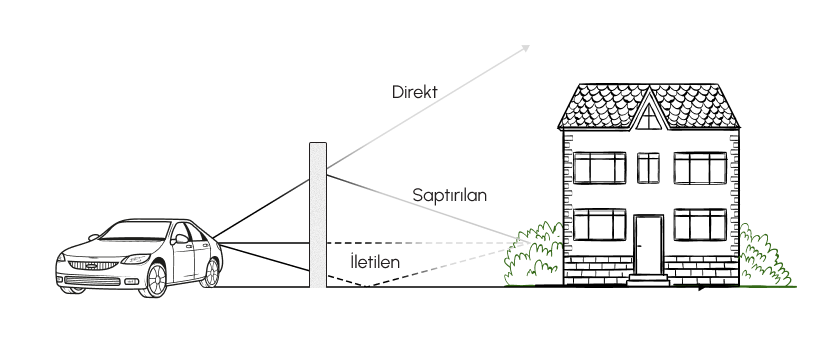Sound Absorption
Sound absorption by a sound barrier is defined by the 'A' classification in EN 1793-1. For example,
an A0/A1 rating means that a significant portion of the incident sound is reflected. An A4 rating
indicates that most of the incident sound is absorbed. This is important in designs with long,
parallel sound barriers facing each other, as sound reflected from a distant barrier can bounce off
a nearby barrier. The EN 1793 sound absorption categories are listed in the table below.
| Category | DL α |
|---|---|
| A0 | None |
| A1 | < 4 dB |
| A2 | 4 to 7 dB |
| A3 | 8 to 10 dB |
| A4 | > 11 dB |
Voice Transmission
The 'B' rating defined in EN 1793-2 indicates the extent to which the associated sound is reduced
when passing through the sound barrier. B0/B1 means that the barrier does not sufficiently attenuate
the sound transmitted through it. A Class B3 barrier, on the other hand, is an efficient barrier
that provides the greatest sound reduction. (Incidentally, the barrier height within the overall
performance is also crucial in determining performance.) These performance ratings are determined by
testing under laboratory and reverberant sound conditions. The EN 1793 sound transmission categories
are listed in the table below.
| Category | DL R |
|---|---|
| B0 | not determined _ |
| B1 | < 15 dB |
| B2 | 15 to 24 dB |
| B3 | > 24 dB |
Airborne Sound Insulation Categories
The 'D' rating is defined in EN 1793-6. It is an area classification. It actually represents the
sound attenuation caused by the barrier as it passes through. These area sound transmittance
categories are listed in the table below.
| Category | DL SI,G |
|---|---|
| D0 | not determined _ |
| D1 | < 16 dB |
| D2 | 16 to 27 dB |
| D3 | 28 to 36 dB |
| D4 | > 36 dB |
EN1793-6:2011 Summary
EN1793-6:2011, Road traffic noise, sound-reducing devices - Test method for the determination of
acoustic performance - Part 6: Intrinsic characteristics - Measurement of the effectiveness of a
sound barrier in reducing transmitted sound in a direct-sound environment. (Figure A.1).

Figure 1 Figure A.1 Transmitted sound and sound traces according to EN1793-6
